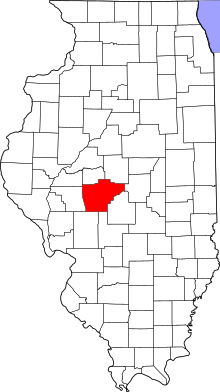Gardner Township, Sangamon County, Illinois
Gardner Township is located in Sangamon County, Illinois. As of the 2010 census, its population was 4,245 and it contained 1,732 housing units.[2] The township contains the unincorporated communities of Bradfordton and Salisbury.
Gardner Township | |
|---|---|
Township | |
 Location in Sangamon County | |
 Sangamon County's location in Illinois | |
| Country | United States |
| State | Illinois |
| County | Sangamon |
| Established | November 6, 1860 |
| Area | |
| • Total | 42.6 sq mi (110 km2) |
| • Land | 42.49 sq mi (110.0 km2) |
| • Water | 0.11 sq mi (0.3 km2) 0.26% |
| Population (2010) | |
| • Estimate (2016)[1] | 4,248 |
| • Density | 99.9/sq mi (38.6/km2) |
| Time zone | UTC-6 (CST) |
| • Summer (DST) | UTC-5 (CDT) |
| FIPS code | 17-167-28651 |
The township annexed the western half of Salisbury Township in 1989, thereby taking in the unincorporated village of Salisbury and increasing in size.
Geography
According to the 2010 census, the township has a total area of 42.6 square miles (110 km2), of which 42.49 square miles (110.0 km2) (or 99.74%) is land and 0.11 square miles (0.28 km2) (or 0.26%) is water.[2]
Demographics
| Historical population | |||
|---|---|---|---|
| Census | Pop. | %± | |
| Est. 2016 | 4,248 | [1] | |
| U.S. Decennial Census[3] | |||
gollark: Of course.
gollark: what if graph (in the mathematical sense) esolang
gollark: what if 3D image esolang using animated image/image sequences
gollark: what if hyperbolic geometry esolang
gollark: hello esolangs users
References
- "Population and Housing Unit Estimates". Retrieved June 9, 2017.
- "Population, Housing Units, Area, and Density: 2010 - County -- County Subdivision and Place -- 2010 Census Summary File 1". United States Census. Archived from the original on 2020-02-12. Retrieved 2013-05-28.
- "Census of Population and Housing". Census.gov. Retrieved June 4, 2016.
This article is issued from Wikipedia. The text is licensed under Creative Commons - Attribution - Sharealike. Additional terms may apply for the media files.
